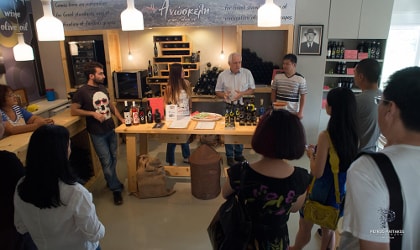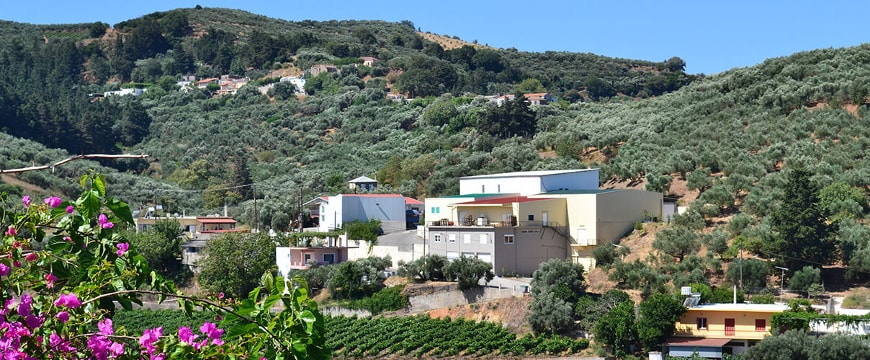Just inside the southern border of the Kolymvari Protected Designation of Origin (PDO) west of Chania, Crete, the little village of Anoskeli is nestled in the foothills of the White Mountains. There the seven Mamidakis siblings were born and raised among thousands of olive trees, grapevines, and citrus trees. And there they started their olive oil business.
Their olive oil venture began long after they had left their village to pursue their education and livelihood in Athens, after they had founded major petroleum, shipping, and hotel businesses. Even after all that, they did not forget their Cretan home town; they did not stop trying to help the islanders that still lived there.
The people of Anoskeli witnessed difficult times in the past, so the Mamidakis siblings’ exodus was unsurprising, but their continuing interest in their home town is noteworthy. Olive oil production had been an important part of family life while the siblings were growing up, and in 1983 the siblings set up the Anoskeli Agricultural Company S.A. In 1988, the family purchased and reconstructed the village olive mill—with villagers still welcome to use the mill for their own olives.
Initially, Anoskeli S.A. produced olive oil just for family and friends. They used the olives on the hills in and around the village, hills that create the special microclimate that makes Anoskeli olive oil unique. However, the reputation of their olive oil grew, and demand for it increased, so the company expanded and renovated their facilities again in 2004, purchased their first bottling machine, and began selling their product to more buyers. Additional work on their olive oil plant in 2009 included an extension for a modern bottling line and new stainless steel machinery.
Now, Anoskeli S.A. produces an annual average of 500 metric tons of olive oil from locally grown olives, 95% Koroneiki (Greece’s most common olive) and 5% Tsounati (a full-flavored local mountain variety), selling it to major Greek supermarket chains and exporting to Europe, Asia, the Middle East, and sometimes North America. With complete control over the entire olive oil production process, and stainless steel tanks with a total storage capacity of 1000 metric tons of olive oil in their giant custom-built warehouse, they are always ready for new markets.
In 2005, the company built a winery and expanded into winemaking. Their boutique winery now produces 20,000 bottles and some French oak barrels of high quality wines annually from grapes grown in the village. They use both Greek (Vidiano, Vilana and Assyrtiko) and French (Syrah, Grenache Rouge and Cabernet Sauvignon) varieties for their dry white, dry red and dry rosé wines, which are sold under the brand name Ano Playa (meaning Upper Mountainside). Their tsikoudia (raki) is called “Ano Kato,” which means upside down -- because Greeks drink it in one shot, up and down!
With the company executives staying up to date on new developments in winemaking and olive oil production, Anoskeli’s certified wines and PDO Kolymvari extra virgin olive oils (EVOOs) have won numerous prestigious awards in international competitions, including silver medals for their EVOO at the prestigious New York International Olive Oil Competition, four silver medals at the international BIOL competition for organic EVOOs, a Gold Asia Wine Trophy, and a Gold Berliner Wein Trophy. Their olive oil has also proven especially healthy, with very high phenolic content.
Remembering the seven Mamidakis siblings’ mother, Eirini (whose name means Peace), the family opened a wine and olive oil tasting room and event space in 2014, naming it in her honor. Anoskeli then began welcoming tourists from around the world who tour the olive mill, production plant, and winery—even the village, olive groves, and vineyards, if arranged in advance--and taste their wines, raki, and olive oil along with some locally made snacks. In 2016, 10,000 visitors toured Anoskeli’s facilities, which welcome visits year round.

With their novel orientation as an agrotourism and culinary tourism destination featuring both olive oil and wine production, the Anoskeli company added a new dimension to the revitalization of their village that had begun with their olive mill renovation and their employment of local workers. Their tasting room attracts guests who learn about the village, eat at its taverna, and sample its local products, as well as providing a space for cultural events that draw others to the village. The company also hosts school groups who tour their facilities and learn about olive oil production, winemaking, and the very healthy traditional Cretan diet.
While providing superior customer service and repeatedly investing in the improvements necessary to make high quality olive oil and wine, the Mamidakis family has always been careful that their agricultural company’s activities do not harm the local environment. Focusing on sustainable eco-friendly practices, they produce organic as well as conventional olive oil, avoid waste, recycle, and re-use. Solids remaining after olive oil production are sent to a factory that makes olive pomace oil. The pits are returned to the village and burned to heat homes in the winter. Olive leaves and branches become nutritious animal feed and fertilizer.
Anoskeli S.A. was born in a land populated with both youthful and aged olive trees, with some trees hundreds of years old right in the village, and another monumental tree that locals claim is the oldest in the world just three kilometers away, in Vouves—a popular attraction for tourists and school groups. The company combines the ancient traditions of olive and grape growing with modern knowledge and techniques to return hope and pride to a village that is no longer left behind. The village name, Anoskeli, travels the world on the company’s extra virgin olive oil bottles.
_______________
Thanks to Anoskeli for providing the information and photos used for this article.


